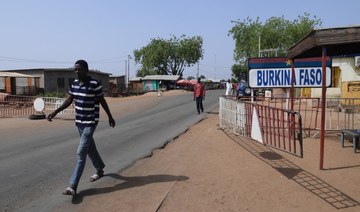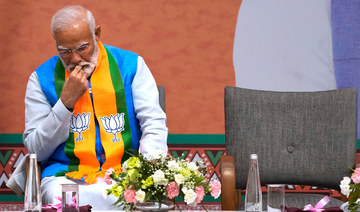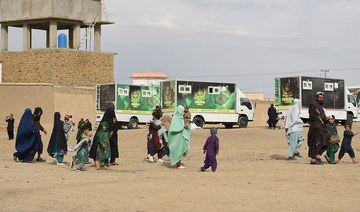ZINDA JAN, Afghanistan: People dug through the rubble of the quake in western Afghanistan for their few possessions but the material losses seemed unimportant.
Saturday’s 6.3 magnitude quake killed and injured thousands when it leveled an untold number of homes in Herat province. Picking through the rubble on Monday, Asadullah Khan paused to think about a future marred by grief.
Khan lost three daughters, his mother and his sister-in-law. Five members of his uncle’s family have died. His neighbors are grief-stricken, too.
“We have lost 23 people in this village,” Khan said.
Mounds of rubble flank the road winding through Zinda Jan district. Some door frames remain standing. There were few people in sight on Monday.
The Taliban-appointed deputy prime minister for economic affairs, Abdul Ghani Baradar, and his team visited the quake-affected region Monday to deliver “immediate relief assistance” and ensure “equitable and accurate distribution of aid,” authorities said.
Top UN officials also went to Zinda Jan to assess the extent of the damage. And in neighboring Pakistan, the government held a special session to review aid for Afghanistan, including relief teams, food, medicine, tents and blankets.
The Taliban’s supreme leader has made no public comments about the quake.
Afghanistan has few reliable statistics but a spokesman for Afghanistan’s national disaster authority, Janan Sayiq, told reporters in Kabul that around 4,000 people were killed or injured by the disaster. He did not provide a breakdown, but the United Nations estimates that 1,023 people were killed and 1,663 people injured in 11 villages in Zinda Jan alone.
Nearly 2,000 houses in 20 villages were destroyed, the Taliban has said. The area hit by the quake has just one government-run hospital.
Saturday’s epicenter was about 40 kilometers (25 miles) northwest of the city of Herat, the provincial capital, the US Geological Survey said. Several of the aftershocks have been strong, including one Monday that again caused residents of the city to rush out of their homes.
More than 35 teams from the military and nonprofit groups are involved in rescue efforts, said Sayiq, from the disaster authority.
The fast-approaching winter, combined with the new disaster, is likely to exacerbate Afghanistan’s existing challenges and make it even harder for people to meet their basic needs, like adequate shelter, food, and medicine, aid groups warn.
Vital infrastructure including bridges was destroyed and emergency response teams have been deployed to provide humanitarian assistance, the International Rescue Committee said.
The global response to the quake has been slow, with much of the world wary of dealing directly with the Taliban-led government and focused on the deadly escalation between Israel and the Palestinians in the aftermath of the surprise attack by Gaza militants on Saturday.
Iranian Foreign Minister Hossein Amirabdollahian called his Afghan Taliban counterpart, Amir Khan Muttaqi, to express his condolences, according to a post on X by Hafiz Zia Ahmad, the deputy spokesman for the foreign ministry in Kabul. The Iranian diplomat “promised humanitarian aid to victims,” said Ahmad.
Meanwhile, the justice ministry has urged national and international charity foundations, businessmen and Afghans to mobilize and gather humanitarian aid for needy people in the province.
“Due to the extent of damages and casualties caused by this incident, a large number of our compatriots in Herat province need urgent humanitarian aid,” the ministry said in a statement.
Afghans are still reeling from recent natural disasters.
A magnitude 6.5 earthquake in March struck much of Pakistan and Afghanistan, and an earthquake hit eastern Afghanistan in June 2022, flattening stone and mud-brick homes and killing at least 1,000 people.
























